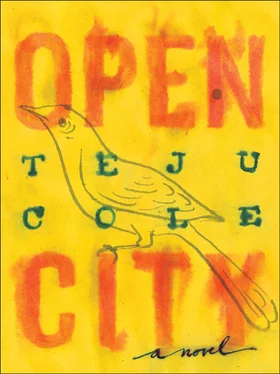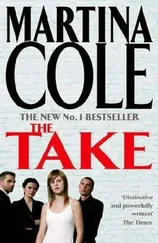Teju Cole - Open City
Здесь есть возможность читать онлайн «Teju Cole - Open City» весь текст электронной книги совершенно бесплатно (целиком полную версию без сокращений). В некоторых случаях можно слушать аудио, скачать через торрент в формате fb2 и присутствует краткое содержание. Год выпуска: 2011, Издательство: Random House, Жанр: Современная проза, на английском языке. Описание произведения, (предисловие) а так же отзывы посетителей доступны на портале библиотеки ЛибКат.
- Название:Open City
- Автор:
- Издательство:Random House
- Жанр:
- Год:2011
- ISBN:нет данных
- Рейтинг книги:5 / 5. Голосов: 1
-
Избранное:Добавить в избранное
- Отзывы:
-
Ваша оценка:
- 100
- 1
- 2
- 3
- 4
- 5
Open City: краткое содержание, описание и аннотация
Предлагаем к чтению аннотацию, описание, краткое содержание или предисловие (зависит от того, что написал сам автор книги «Open City»). Если вы не нашли необходимую информацию о книге — напишите в комментариях, мы постараемся отыскать её.
But it is not only a physical landscape he covers; Julius crisscrosses social territory as well, encountering people from different cultures and classes who will provide insight on his journey — which takes him to Brussels, to the Nigeria of his youth, and into the most unrecognizable facets of his own soul.
Open City — читать онлайн бесплатно полную книгу (весь текст) целиком
Ниже представлен текст книги, разбитый по страницам. Система сохранения места последней прочитанной страницы, позволяет с удобством читать онлайн бесплатно книгу «Open City», без необходимости каждый раз заново искать на чём Вы остановились. Поставьте закладку, и сможете в любой момент перейти на страницу, на которой закончили чтение.
Интервал:
Закладка:
Then it stopped. Above the noise, we heard the blaze of sirens on the east side of the park. Four police officers came racing over the ropes around the perimeter of the lawn and ran toward its center. One was white, one Asian, and the other two were black, all as ungainly in their movement as the parachuters had been balletic. We began to boo, safe in our numbers, and were pushed back from the congratulatory circle we had formed, so that they could arrest the daredevils. Someone at the far end of the circle shouted “Security theater!” but the wind had picked up, and it swallowed her voice.
The parachutists did not resist arrest. No longer encumbered by their wings, they were led away by the police. The crowd began to cheer again, and the parachutists, all young men, grinned and bowed. One of them, taller than the other two, had a full ginger beard that glinted in the sun. The parachutes remained in a glossy heap in the grass and, when the wind picked up again, seemed to give off trembling exhalations. And so we watched the parachutes breathe for a while, while the men were led away. Then, but only after what seemed like a long time out of ordinary time, we came out of the marvelous and resumed our picnic. Something had appeared in the sky, defying nature. My friend, who seemed to have read my thoughts, said, You have to set yourself a challenge, and you must find a way to meet it exactly, whether it is a parachute, or a dive from a cliff, or sitting perfectly still for an hour, and you must accomplish it in a beautiful way, of course.
Moji, Dayo Kasali’s sister, lay prone, a straw hat over her head. Lise-Anne and my friend were well matched, I thought. I had never met her, but he had assured me that she was his ideal companion. There was a balance in his seriousness and her natural lightness. She already understood him, which was more than could be said for his last several girlfriends. His love of philosophy was equaled by the way he (as he once put it to me) practiced biology. My friend was often forgiven his inconstancy; the willingness of women to forgive him came with his being the suave creature he was. For him to be understood, as she seemed to instinctively understand him, was rarer.
Near us, a wisteria’s boughs hung low, the petals on its purple blooms reticulated and busy with resurrection. There were some tulips, Sultans of Spring, I supposed, with large silken petals that were like ears. Bees collided again and again with the flowers, tracing flight paths all around us. On our way into the park, Moji had said to me that she was more worried than ever about the environment. Her tone was serious. When I responded that I supposed we all were, she corrected me, shaking her head. What I mean is that I actively worry about it, she said, I don’t think that’s generally true of other people. I think I waste things, I have bad habits like most of the Americans around me. Like most people in the world, I suppose. My awareness of it has intensified in the past couple of months, she said.
I had attempted to meet the issue in the right way. I asked her if she worried about things like air travel. I knew that she went to Nigeria at least once a year. Wasn’t she concerned about the environmental effect of jet fuel, and all that? She responded that she was. Then our conversation trailed off when Lise-Anne and my friend, walking a few steps behind, caught up with us again, and she began to tell us about life in Troldhaugen, where she’d grown up. Now, as I watched park workers fold up the parachutes, I remembered that brief earlier exchange with Moji. I had heard the environmental concern often enough to know how earnest a priority it was for some people, but I did not, as yet, feel it seriously in my bones. I had not experienced a fervor over it. I did not pause to consider whether to use paper or plastic, and I only ever recycled out of convenience, not out of some belief that recycling made a real difference. But already, I was starting to respect those who were fervent. It was a cause, and I was distrustful of causes, but it was also a choice, and I found my admiration for decisive choice increasing, because I was so essentially indecisive myself.
Moji lifted the hat off her face, and a bee that had been troubling her reassessed the situation and flew off in the direction of the nearest bloom. The sky had turned a darker blue, and the air was cooler. She brushed her cheek with her hand. I looked at her, and found her puzzling. She was too tall, and her eyes were small. Her face was dark, so dark that it had faint purple notes in it, but she was not beautiful in the way I expected dark women to be. You know what I know about bees? she said all of a sudden, breaking into my thoughts. That the name Africanized killer bees is a piece of racist bullshit. Africanized killers: as if we don’t have enough to deal with without African becoming a shorthand for murderous. She leaned forward to pluck a grape from its stem on the plate. She was wearing a tank top, and I caught sight of the dark curve of her breast.
Around the country, I said, bees are dying and the scientists don’t know why. I’ve always found bees inscrutable. They are obsessed in ways that elude humans, and now they are falling prey to mass death. It has something to do with weather patterns or pesticides, I think, or perhaps some genetic change is at the heart of it. Already, one in every three bees has died, and more are to follow; the percentage is increasing all the time. For so long, I said, they have been used as machines for making honey, their obsession was turned to human advantage. Now they are proving adept at dying, too, dying from some terrible disorder in the order Hymenoptera.
There were nods and smiles. Lise-Anne looked at me with some admiration, and my friend mocked me with his eyes. Moji said she’d read something about the phenomenon, that it was called colony collapse disorder. It is quite widespread by now, she said, common all over Europe and North America, even as far as Taiwan. And isn’t it something also to do with genetically modified maize? My friend put his head in Lise-Anne’s lap, and said, That sounds like something out of imperial history: colony collapse disorder! The natives are restless, Your Majesty, we can’t hold on to these colonies much longer. Lise-Anne said, Does any of you know El Espíritu de la Colmena ? It’s a film by a man named Erice, made in the seventies. In that film, bees represent, I don’t know what, but it seems that, in a violent and sad time in Spanish history, they represented a different way of thinking, a way of thinking and being that was specific to bees, but that was related to the human world. There are some scenes in that film that, really, are under my skin now. I think of the ones where the father — he has two young daughters, and one of them is called Ana, just like that little girl who was over there a moment ago — the scenes where the father is kind of shell-shocked, or in the cage of some memory he cannot talk about, and just works at the beehive. Those scenes are very moving, they are without dialogue or plot, but they are effective. Anyway, I don’t know what my point is, but maybe bees are sensitive, unusually sensitive, to all the negativity in the human world. Maybe they are connected to us in some essential way that we haven’t figured out yet, and their death is a warning of some sort to us, like the canaries in a coal mine, sensitive to an emergency that will soon be apparent to dull, slow human beings.
I hadn’t seen Erice’s film, but the collapse of the bee populations made me think of something else, which I now connected to what Lise-Anne had just described. The lack of familiarity with mass death, with plague, war, and famine, seemed to me a new thing in human history. These last few decades, I said to my friends, in which wars flare up in patches instead of being all-consuming, and agriculture no longer evokes elemental fear, and the seasonal variations in weather are not harbingers of starvation, is an anomaly in human history. We are the first humans who are completely unprepared for disaster. It is dangerous to live in a secure world. Look at this harmless and beautiful stunt by the parachutists. We know that they are in the right, right for having made something memorable for us, at some personal risk, but the police are charged with keeping us safe at all times, empowered to secure us with the force of arms, and protect us even from pleasure. I often think of the long nineteenth century, which, in all parts of the world, was one interminable bloodbath, an orgy of continuous killing, whether in Prussia or in the United States, or in the Andes or in West Africa. Butchery was the norm, and nations went to war on the slightest pretexts. And it went on and on, interrupted by brief pauses for rearmament. Think of the epidemics that wiped out ten, twenty, even thirty percent of populations in Europe: I read somewhere recently that the city of Leiden lost thirty-five percent of its population in a five-year period in the 1630s. What could it mean to live with such a possibility, with people of all ages dropping dead around you all the time? The thing is that we have no idea. In fact, when I read it, it was as a footnote in an article talking about something else, an article about painting or furniture.
Читать дальшеИнтервал:
Закладка:
Похожие книги на «Open City»
Представляем Вашему вниманию похожие книги на «Open City» списком для выбора. Мы отобрали схожую по названию и смыслу литературу в надежде предоставить читателям больше вариантов отыскать новые, интересные, ещё непрочитанные произведения.
Обсуждение, отзывы о книге «Open City» и просто собственные мнения читателей. Оставьте ваши комментарии, напишите, что Вы думаете о произведении, его смысле или главных героях. Укажите что конкретно понравилось, а что нет, и почему Вы так считаете.












